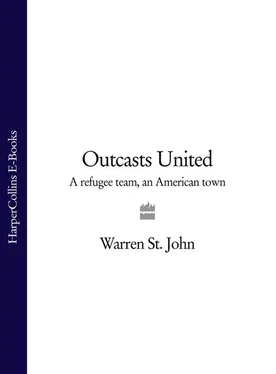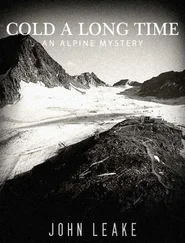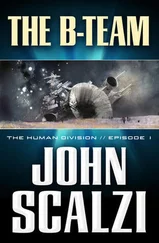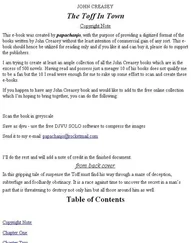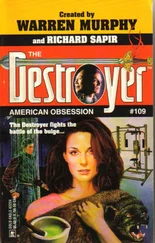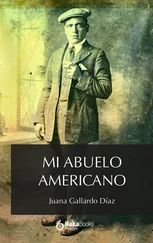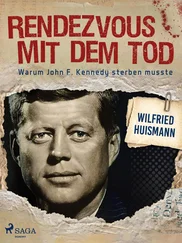That was the background, but the specific image that stuck in my mind that day was this: every time the ball rolled Zubaid’s way, his teammates, faster and more agile than he was to a player, never interfered or snuck in to take it away from him. Instead, two or three members of the Fugees would drop in five or so yards behind him, just far enough out of the way so as not to seem conspicuous, to form a protective cordon between Zubaid and the goal. When he missed the ball with an ungainly swing of the leg, they were there to cover for him, but always subtly, and never in a way that demeaned him or his effort.
Eventually, late in the game, one of the North Atlanta forwards broke loose with the ball on Zubaid’s side of the pitch, and he rushed upfield to defend. He extended his leg, and the ball locked between the tops of the two players’ forefeet with a loud thwump . The ball stopped, and the North Atlanta player tumbled forward onto the turf: a perfect tackle. Much to his surprise, it seemed, Zubaid found himself alone, still standing and with possession of the ball, which he quickly passed toward a teammate in midfield. At the next break, when the ball went into touch, Zubaid was set upon by his teammates as though he’d scored the winning goal.
SOON AFTER THAT first game, I resolved to pull up stakes in New York and to move to Atlanta to tell the story of the Fugees. I saw a great deal of football over the next few months, but the most moving moments for me—and the most instructive and insightful—came not on the touchline but over hot cups of sugary tea, over meals of stewed cassava or beans and rice, or platters of steaming Afghan mantu, on the sofas and floors of the apartments of refugees in Clarkston. And yet I also found that the game of football itself provided a useful framework for trying to understand how this unlikely group of people had come together. Unlike basketball, baseball, or American football, games that reset after each play, football unfolds fluidly and continuously. To understand how a goal was scored, you have to work back through the action—the sequences of passes and decisions, the movement of the players away from the action who reappear unexpectedly in empty space to create or waste opportunities—all the way back to the first touch. If that goal was scored by a young refugee from Liberia, from a pass by a boy from southern Sudan, who was set up by a player from Burundi or a Kurd from Iraq—on a field in Georgia, U.S.A., no less—understanding its origins would mean following the thread of causation back in time to events that long preceded the first whistle.
Relatively quickly, it became clear that the story of the Fugees was also the story of a place, and that place offered as many intriguing mysteries as the boys and their coach. Until relatively recently, Clarkston had been a homogenous, white southern town, situated on 1.1 square miles of Georgia clay about thirteen miles east of downtown Atlanta. The town’s motto spoke to its humble origins: “Small Town … Big Heart.” But the resettlement process, which had the effect of cramming perhaps a century’s worth of normal migration patterns into roughly a decade, had tested the sentiment behind Clarkston’s motto. Adding to the complication: the newcomers in Clarkston were not a homogenous linguistic or cultural group of, say, Somalis, whose appearance had transformed some small American towns like Lewiston, Maine, but a sampling of the world’s citizens from dozens of countries and ethnic groups. The local high school in Clarkston, once all white, now had students from more than fifty different countries. Cultures were colliding in Clarkston, and the result was a raw and exceptionally charged experiment in getting along.
When I first decided to write about the Fugees, I wasn’t sure how, or even if, the story of the remaking of Clarkston and the story of a refugee football team there would explicitly overlap. But about a month before I planned to leave New York to head to Clarkston to follow the Fugees, I got a clue that the stories were more intertwined than I could have realized. A dispute erupted between the mayor of Clarkston, a retired heating and plumbing contractor named Lee Swaney, and a group of young Sudanese refugees who were playing casual games of football on the only general-use field in the town park. The local paper, the Atlanta Journal-Constitution , got wind of the dispute and asked the mayor to explain his stance.
“There will be nothing but baseball down there as long as I’m mayor,” he told the paper. “Those fields weren’t made for soccer.”
The mayor’s proclamation had a direct impact on the Fugees, who had recently lost their home ground after a dispute with their hosts at the local community center. Luma had hoped to relocate the Fugees to the town park—the very park from which Mayor Swaney had banned football. And so with only a few weeks to go before trials, she found herself scrambling to find her team a home.
The mayor’s decree hinted at tensions that went well beyond issues of turf management. In Clarkston, football, it seemed, meant something different from what it meant in most places. It was the international game in a town that had had its fill of international influences. The experiment in getting along, it seemed to me, was apparently very much ongoing, and the results would have relevance well beyond Clarkston. The question of how to cope with cultural, ethnic, and religious diversity—that loaded concept—is a pressing one. As the author Mary Pipher wrote about refugees who had been resettled in Nebraska in her book The Middle of Everywhere , “The refugee experience of dislocation, cultural bereavement, confusion and constant change will soon be all of our experience. As the world becomes globalized, we’ll all be searching for home.”
WHEN I THINK about Clarkston, I sometimes visualize the town as a lifeboat being lowered from a vast, multilevel passenger ship. No one aboard chose this particular vessel. Rather, they were assigned to it—the refugees by resettlement officials they never met, the towns-people by a faraway bureaucratic apparatus that decided, almost haphazardly, to put a sampling of people from all over the world in the modest little boat locals thought they had claimed for themselves. In an instant, the boat was set upon a roiling sea, its passengers left to fend for themselves. Everyone on the boat wanted the same thing: safety. But to get there, they would first have to figure out how to communicate with each other, how to organize themselves, how to allocate their resources, and which direction they should row. I imagine their heads bobbing in and out of view between the troughs and crests of the wind-whipped sea as they begin their journey. And I wonder: What will they do? What would I do in that same situation? And: Will they make it?
IT’S HARD TO know exactly where to begin the story of the Fugees. The violence that led young Grace Balegamire from Congo to Clarkston in the early twenty-first century had its origins in the 1870s, when King Leopold II of Belgium established the Free State of Congo, a corporate state that pillaged the region around the Congo River of its natural resources, terrorized the population, and gave way over time to a collection of politically unstable nations divided by ethnic tension. The tribal violence that drove Beatrice Ziaty, a Liberian refugee whose sons Jeremiah and Mandela played on the Fugees, from Monrovia to Clarkston grew ultimately from the decision of a group of Americans in the mid-nineteenth century to relocate freed slaves from the United States after emancipation, a process that created a favored and much-resented ruling tribe with little or no organic connection to the nation it ruled. The story might begin in 1998, when Slobodan Milosevic decided to unleash the Yugoslav army on the people of Kosovo and gave his soldiers the go-ahead to rampage through villages in Kosovo such as Kacanik, where Qendrim Bushi’s family had a small grocery store that Serb soldiers torched—though that conflict too had beginnings in age-old political and ethnic tensions in that region. Or one might start near Clemson, South Carolina, where Lee Swaney—the future mayor of Clarkston, Georgia—was born in 1939, well before integration changed the South.
Читать дальше
